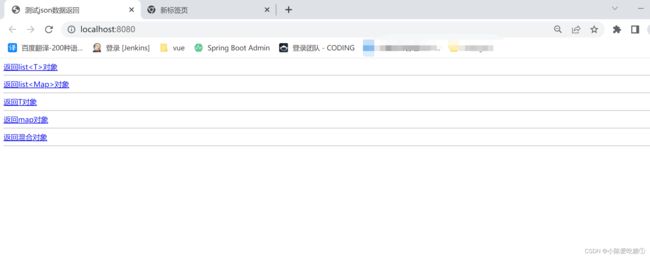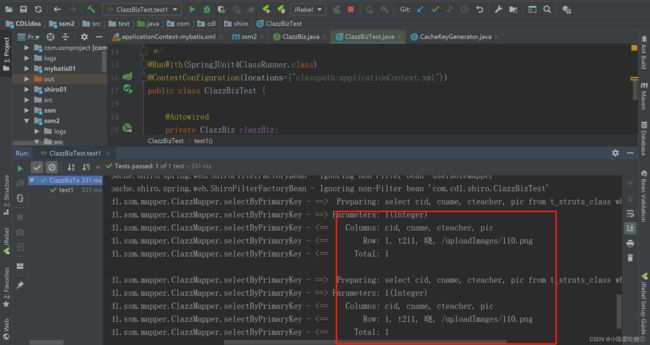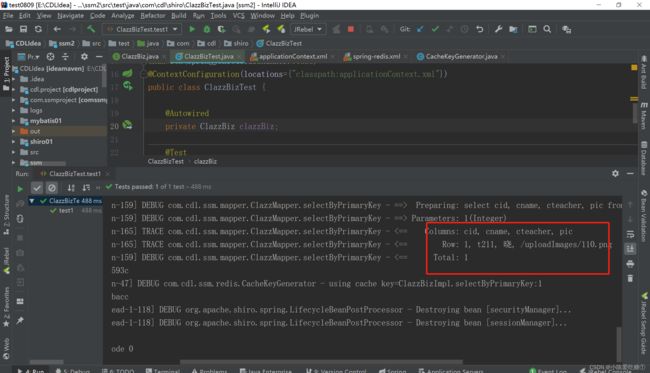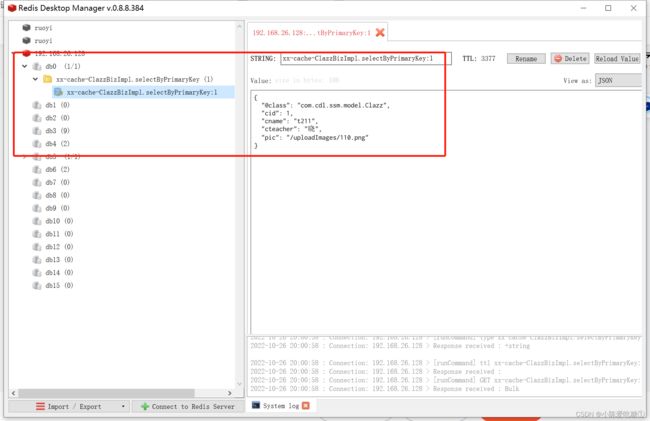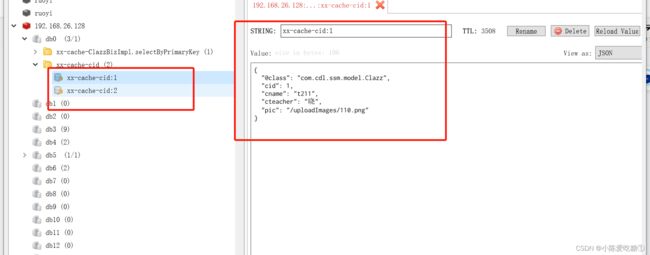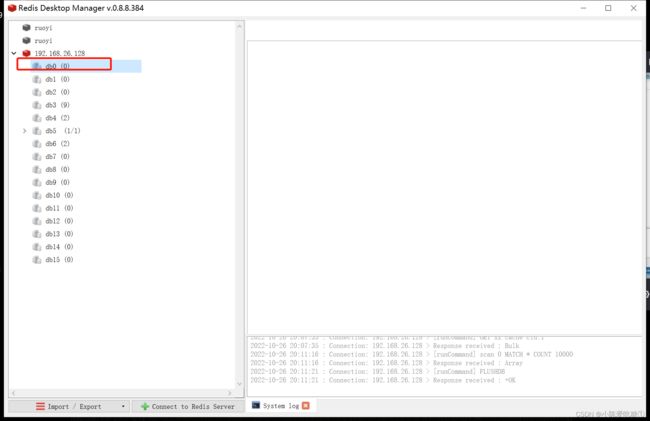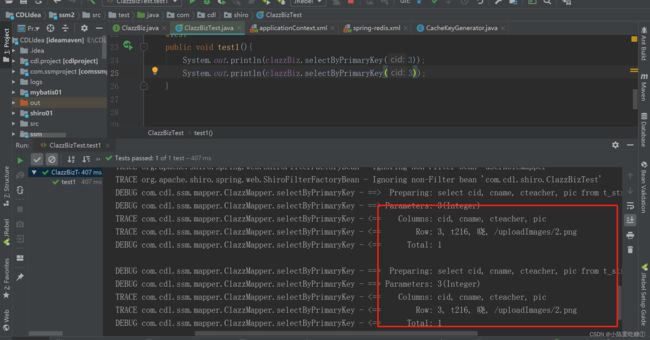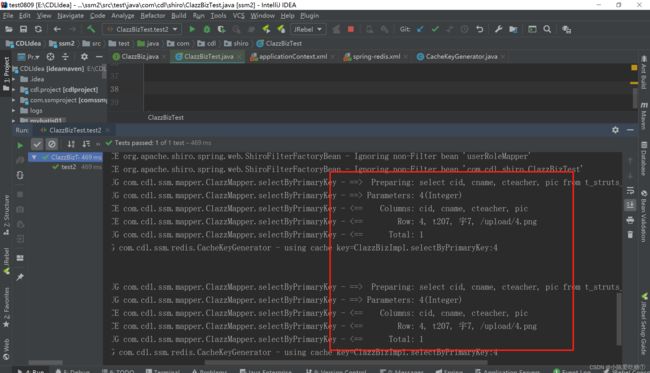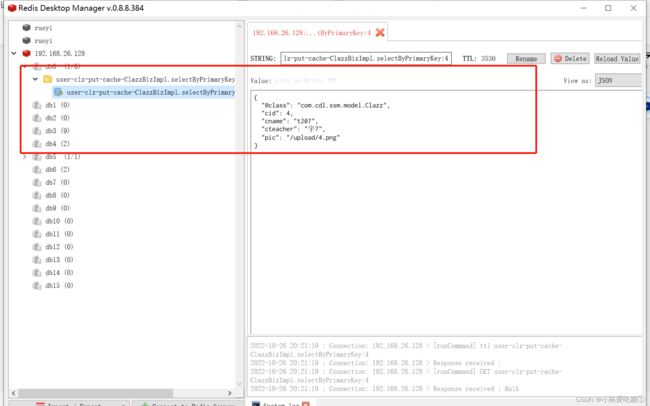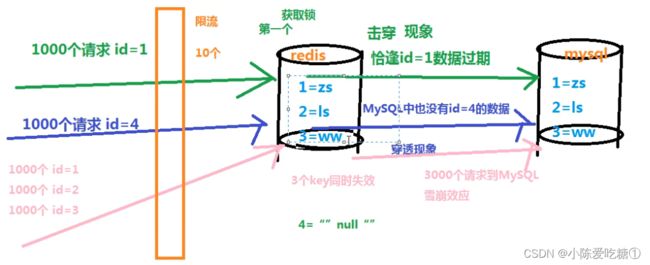Redis:SSM之spring注解式缓存redis
目录
一、spring整合redis
启动服务
添加pom依赖
配置文件
二、redis的注解式开发
三、redis击穿穿透雪崩
一、spring整合redis
本人没有使用云服务,用的是虚拟机,所以先要将虚拟机启动,再通过Linux客户端(连接工具)启动redis的服务
启动服务
在现有的ssm项目中添加pom依赖、配置文件、spring-redis的整合文件
添加pom依赖
2.9.0
1.7.1.RELEASE
redis.clients
jedis
${redis.version}
org.springframework.data
spring-data-redis
${redis.spring.version}
配置文件
redis.properties
redis.hostName=192.168.26.128
redis.port=6379
redis.password=123456
redis.timeout=10000
redis.maxIdle=300
redis.maxTotal=1000
redis.maxWaitMillis=1000
redis.minEvictableIdleTimeMillis=300000
redis.numTestsPerEvictionRun=1024
redis.timeBetweenEvictionRunsMillis=30000
redis.testOnBorrow=true
redis.testWhileIdle=true
redis.expiration=3600spring-redis.xml
注意:redis.properties与jdbc.properties在与Spring做整合时会发生冲突;所以引入配置文件的地方要放到SpringContext.xml中
SpringContext.xml
classpath:jdbc.properties
classpath:redis.properties
放入了applicationContext.xml中
classpath:jdbc.properties
classpath:redis.properties
CacheKeyGenerator
package com.cdl.ssm.redis;
import lombok.extern.slf4j.Slf4j;
import org.springframework.cache.interceptor.KeyGenerator;
import org.springframework.util.ClassUtils;
import java.lang.reflect.Array;
import java.lang.reflect.Method;
@Slf4j
public class CacheKeyGenerator implements KeyGenerator {
// custom cache key
public static final int NO_PARAM_KEY = 0;
public static final int NULL_PARAM_KEY = 53;
@Override
public Object generate(Object target, Method method, Object... params) {
StringBuilder key = new StringBuilder();
key.append(target.getClass().getSimpleName()).append(".").append(method.getName()).append(":");
if (params.length == 0) {
key.append(NO_PARAM_KEY);
} else {
int count = 0;
for (Object param : params) {
if (0 != count) {//参数之间用,进行分隔
key.append(',');
}
if (param == null) {
key.append(NULL_PARAM_KEY);
} else if (ClassUtils.isPrimitiveArray(param.getClass())) {
int length = Array.getLength(param);
for (int i = 0; i < length; i++) {
key.append(Array.get(param, i));
key.append(',');
}
} else if (ClassUtils.isPrimitiveOrWrapper(param.getClass()) || param instanceof String) {
key.append(param);
} else {//Java一定要重写hashCode和eqauls
key.append(param.hashCode());
}
count++;
}
}
String finalKey = key.toString();
// IEDA要安装lombok插件
log.debug("using cache key={}", finalKey);
return finalKey;
}
}
整合成功
二、redis的注解式开发
@Cacheable 配置在方法或类上,作用:本方法执行后,先去缓存看有没有数据,如果没有,从数据库中查找出来,给缓存中存一份,返回结果, 下次本方法执行,在缓存未过期情况下,先在缓存中查找,有的话直接返回,没有的话从数据库查找
package com.cdl.shiro;
import com.cdl.ssm.biz.ClazzBiz;
import org.junit.Test;
import org.junit.runner.RunWith;
import org.springframework.beans.factory.annotation.Autowired;
import org.springframework.test.context.ContextConfiguration;
import org.springframework.test.context.junit4.SpringJUnit4ClassRunner;
/**
* @author cdl
* @site www.cdl.com
* @create 2022-10-26 19:34
*/
@RunWith(SpringJUnit4ClassRunner.class)
@ContextConfiguration(locations={"classpath:applicationContext.xml"})
public class ClazzBizTest {
@Autowired
private ClazzBiz clazzBiz;
@Test
public void test1(){
System.out.println(clazzBiz.selectByPrimaryKey(1));
System.out.println(clazzBiz.selectByPrimaryKey(1));
}
}
此时的ClazzBiz
package com.cdl.ssm.biz;
import com.cdl.ssm.model.Clazz;
import com.cdl.ssm.util.PageBean;
import java.util.List;
import java.util.Map;
public interface ClazzBiz {
int deleteByPrimaryKey(Integer cid);
int insert(Clazz record);
int insertSelective(Clazz record);
Clazz selectByPrimaryKey(Integer cid);
List listPager(Clazz clazz, PageBean pageBean);
int updateByPrimaryKeySelective(Clazz record);
int updateByPrimaryKey(Clazz record);
List 修改ClazzBiz 添加一个注释
value:缓存位置的一段名称,不能为空
key:缓存的key,默认为空,表示使用方法的参数类型及参数值作为key,支持SpEL
condition:触发条件,满足条件就加入缓存,默认为空,表示全部都加入缓存,支持SpEL
@Cacheable(value = "xx")
Clazz selectByPrimaryKey(Integer cid);效果:SQL语句只执行了一次 数据从缓存里拿
此时redis中
再次修改注释里面的属性 key改变原有的key生成规则
@Cacheable(value = "xx",key = "'cid:'+#cid")
Clazz selectByPrimaryKey(Integer cid); @Test
public void test1(){
System.out.println(clazzBiz.selectByPrimaryKey(2));
System.out.println(clazzBiz.selectByPrimaryKey(2));
}再次修改注释里面的属性 condition判断什么时候修改key属性 将库清空
@Cacheable(value = "xx",key = "'cid:'+#cid",condition = "#cid > 5")
Clazz selectByPrimaryKey(Integer cid); @Test
public void test1(){
System.out.println(clazzBiz.selectByPrimaryKey(3));
System.out.println(clazzBiz.selectByPrimaryKey(3));
}效果:查了两次数据库
@CachePut 类似于更新操作,即每次不管缓存中有没有结果,都从数据库查找结果,并将结果更新到缓存,并返回结果
value 缓存的名称,在 spring 配置文件中定义,必须指定至少一个
key 缓存的 key,可以为空,如果指定要按照 SpEL 表达式编写,如果不指定,则缺省按照方法的所有参数进行组合
condition 缓存的条件,可以为空,使用 SpEL 编写,返回 true 或者 false,只有为 true 才进行缓存
ClazzBiz
package com.cdl.ssm.biz;
import com.cdl.ssm.model.Clazz;
import com.cdl.ssm.util.PageBean;
import org.springframework.cache.annotation.CachePut;
import java.util.List;
import java.util.Map;
public interface ClazzBiz {
int deleteByPrimaryKey(Integer cid);
int insert(Clazz record);
int insertSelective(Clazz record);
// @Cacheable(value = "xx",key = "'cid:'+#cid",condition = "#cid > 5")
// Clazz selectByPrimaryKey(Integer cid);
@CachePut(value = "user-clz-put")
Clazz selectByPrimaryKey(Integer cid);
List listPager(Clazz clazz, PageBean pageBean);
int updateByPrimaryKeySelective(Clazz record);
int updateByPrimaryKey(Clazz record);
List ClazzBizTest
package com.cdl.shiro;
import com.cdl.ssm.biz.ClazzBiz;
import org.junit.Test;
import org.junit.runner.RunWith;
import org.springframework.beans.factory.annotation.Autowired;
import org.springframework.test.context.ContextConfiguration;
import org.springframework.test.context.junit4.SpringJUnit4ClassRunner;
/**
* @author cdl
* @site www.cdl.com
* @create 2022-10-26 19:34
*/
@RunWith(SpringJUnit4ClassRunner.class)
@ContextConfiguration(locations={"classpath:applicationContext.xml"})
public class ClazzBizTest {
@Autowired
private ClazzBiz clazzBiz;
// @Test
// public void test1(){
// System.out.println(clazzBiz.selectByPrimaryKey(3));
// System.out.println(clazzBiz.selectByPrimaryKey(3));
// }
@Test
public void test2(){
// 测试 Cacheput 中的 key
System.out.println(clazzBiz.selectByPrimaryKey(4));
System.out.println("======================================");
System.out.println(clazzBiz.selectByPrimaryKey(4));
}
}
效果图:
实行了两次查询 没有走缓存
只存不取
@CacheEvict 用来清除用在本方法或者类上的缓存数据(用在哪里清除哪里)
value:缓存位置的一段名称,不能为空
key:缓存的key,默认为空,表示使用方法的参数类型及参数值作为key,支持SpEL
condition:触发条件,满足条件就加入缓存,默认为空,表示全部都加入缓存,支持SpEL
allEntries:true表示清除value中的全部缓存,默认为false
@CacheEvict(value = "xx",key = "'cid:'+#cid") //删除指定的缓存数据
// @CacheEvict(value = "xx",allEntries = true) // 删除以 user-clz-put开头的 缓存
int updateByPrimaryKey(Clazz record); @Test
public void test3(){
// 测试 CacheEvict 中的 key
clazzBiz.deleteByPrimaryKey(8);
}没有了cid为8的
测试结果:可以配置删除指定缓存数据,也可以删除符合规则的所有缓存数据;
三、redis击穿穿透雪崩
击穿:高并发量的同时key失效,导致请求直接到达数据库;
设置锁
1.获取 Redis 锁,如果没有获取到,则回到任务队列继续排队
2.获取到锁,从数据库拉取数据并放入缓存中
3.释放锁,其他请求从缓存中拿到数据限流:请求redis之前做流量削峰
穿透: 很多请求都在访问数据库一定不存在的数据,造成请求将缓存和数据库都穿透的情况。
规则排除
可以增加一些参数检验。例如数据库数据 id 一般都是递增的,如果请求 id = -10 这种参数,势必绕过Redis。避免这种情况,可以对用户真实性检验等操作。null值填充
当缓存穿透时,redis存入一个类似null的值,下次访问则直接缓存返回空,当数据库中存在该数据的值则需要把redis存在的null值清除并载入新值,此方案不能解决频繁随机不规则的key请求。
雪崩: 雪崩和击穿类似,不同的是击穿是一个热点 Key 某时刻失效,而雪崩是大量的热点 Key 在一瞬间失效 。
给不同的热点key设置不同的缓存策略
图形解释:

